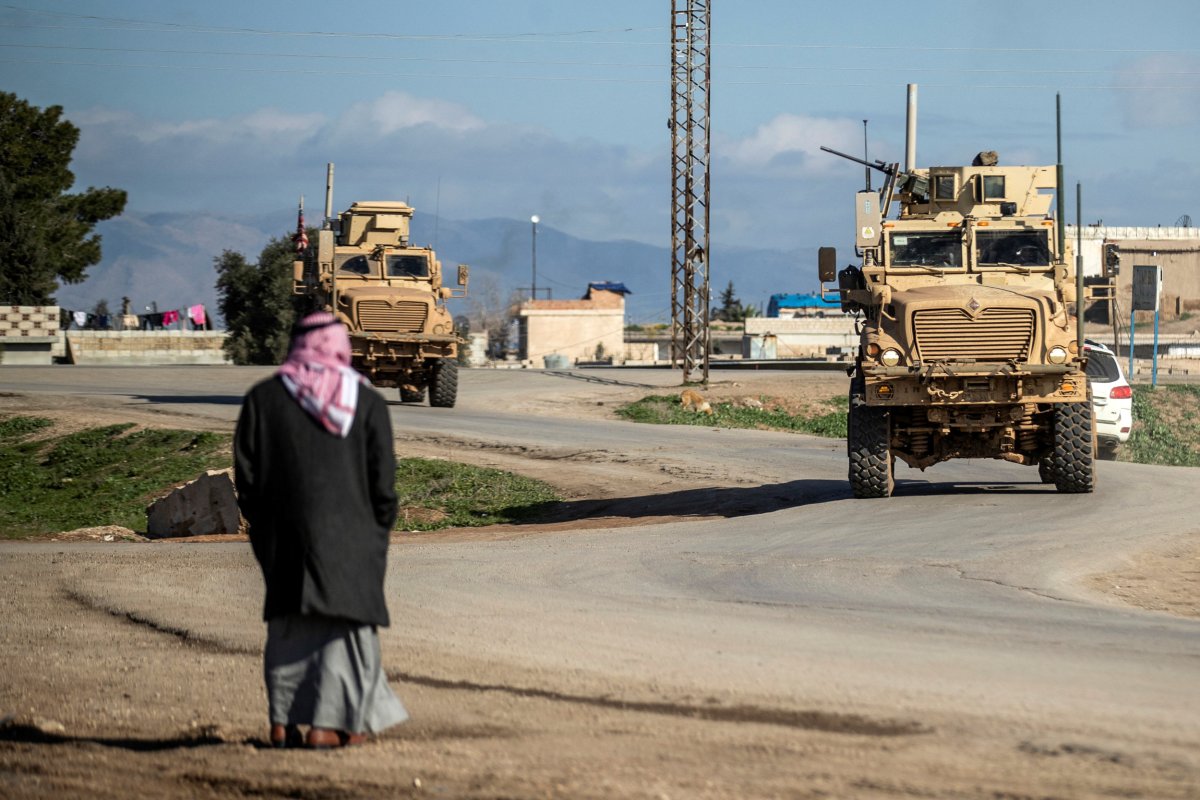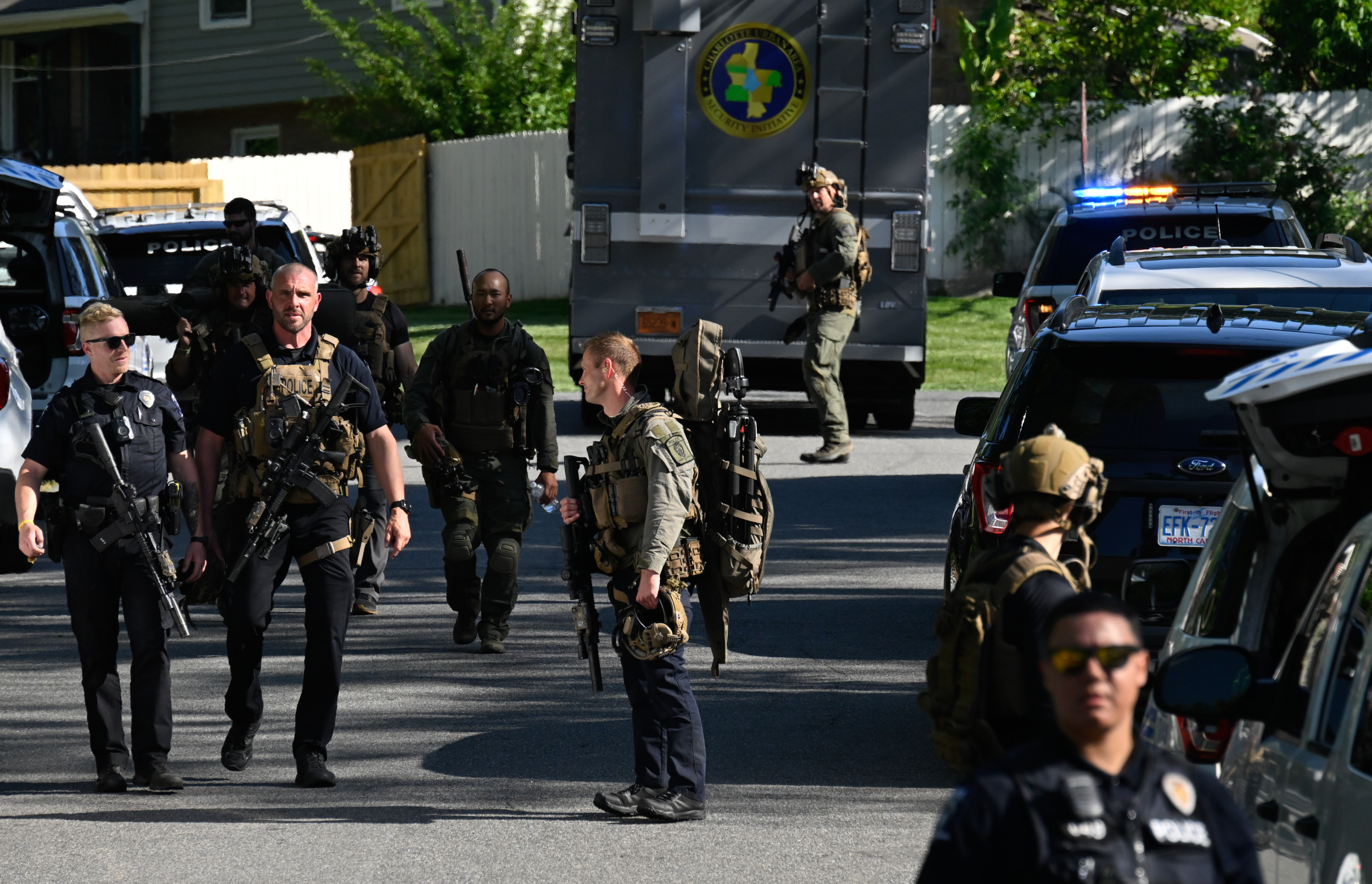Syrian officials have told Newsweek that the crisis gripping the Middle East, including clashes between U.S. troops and a coalition of militias aligned with Syria's ally, Iran, should serve as a message to President Joe Biden to pull his troops out of the country.
Although the Pentagon has remained adamant that the presence of United States forces in Syria remained a necessary component in the effort to ensure the lasting defeat of the Islamic State militant group (ISIS), Damascus has always considered Washington's near-decade-long deployment of soldiers in the nation to be a violation of United Nations conventions.
"The Syrian Arab Republic reiterates that the presence of U.S. troops on Syrian territory is illegal, illegitimate, and constitutes a flagrant violation of the United Nations Charter and international law," the Syrian Mission to the United Nations told Newsweek.
"This illegal military presence serves and complements the destabilizing policies of the U.S. administrations," the Mission added, "including the support it provides for its terrorist tools and separatist militias, its continued plundering of Syrian national wealth, and the catastrophic repercussions of the unilateral coercive measures it imposes on the Syrian people."
While both the Iran- and Russia-supported Syrian military and the U.S.-led coalition-backed, Kurdish-led Syrian Democratic Forces (SDF) militia waged separate campaigns against ISIS, U.S. troops in Syria have increasingly come under fire from Iran-backed militias amid worsening tensions between Washington and Tehran stemming back from at least 2019.
Now, with the war between Israel and the Palestinian Hamas movement in Gaza stoking new regional tensions and militia rocket and drone attacks against U.S. forces being met with more intensive airstrikes, the Syrian Mission warned that "the current developments in the region should serve as an opportunity for the United States to rectify its misguided policies, which have only contributed to the destabilization of security and stability in Syria and the broader region."
Newsweek reached out to U.S. Central Command and the U.S. State Department for comment.

U.S. Frontlines with Iran and Russia
Syria has long served as a flashpoint for the U.S. and two of its top declared adversaries, Iran and Russia. The two nations intervened militarily when Syria collapsed into civil war in 2011, backing President Bashar al-Assad, who Washington and a number of its international partners have accused of war crimes against an array of opposition forces, including U.S.-backed rebels and jihadi elements.
By 2014, Iran had mobilized a vast network of militias with support from the Islamic Revolutionary Guard Corps (IRGC) to counter rapid advances by ISIS in both Iraq and Syria. That same year, the U.S. organized an international coalition of nations to fight ISIS. In 2015, Russia intervened directly in support of Assad while the U.S. backed the SDF.
Moscow's intervention helped Damascus turn the tides in the midst of the ongoing civil war, but the SDF retained territory across the country's northeast, establishing an autonomous government. The Syrian military and the SDF have since alternatively fought with one another against Islamist insurgents and against one another in clashes over opposing views of the nation's governance.
The SDF has sought to win greater independence for the northeast, including more rights for Kurds and other ethnic minorities, while Assad's administration has insisted that a return to central government rule would be the only solution to lasting security in overwhelmingly majority-Arab Syria. Reconciliation talks have repeatedly failed.
Today, roughly 900 U.S. troops remain in the country, largely tasked with patrolling the oil- and gas-rich, SDF-run northeast, as well as manning a remote southeast garrison in the rebel-held Al-Tanf desert region. In the past, tensions have emerged as U.S. and Russian troops came to blows over shared roads in the northeast, and Iran-backed militias have intermittently targeted U.S. and SDF personnel.
During a meeting with Assad in Damascus earlier this month, Iranian Foreign Minister Hossein Amir-Abdollahian referred to Syria as "the frontlines of the Axis of Resistance," the name given to the Tehran-aligned network of militias opposed to Israel and the U.S. military presence in the region. Iran has consistently denied having direct control of these groups but has praised their actions.
The Gaza Connection
The deadliest-ever war in Gaza, sparked by Hamas' unprecedented October 7, 2023, surprise attack on Israel, has provided a new impetus for the Axis of Resistance to lash out against U.S. forces. Not since the U.S. killing of IRGC Quds Force commander Major General Qassem Soleimani in 2020 have U.S. troops come under such sustained fire.
Both former President Donald Trump and his successor, Biden, have ordered airstrikes on these militias in Iraq and Syria in retaliation to attacks on U.S. soldiers in Iraq and Syria. The deaths of three U.S. troops in a drone attack at the Jordan-Syria border late last month, however, drew particular outrage in Washington, and days later, Biden ordered a series of 85 strikes against seven facilities in Iraq and Syria, along with the assassination of a senior official of Iraq's Kataib Hezbollah militia.
Yet Axis of Resistance forces have continued to defy U.S. military action. Beyond the Levant, Yemen's Ansar Allah, also known as the Houthis, has pressed on with targeting commercial vessels in the Red Sea and the Gulf of Aden, even as the U.S. and the United Kingdom bombard the southern Arabian Peninsula nation with airstrikes.
At the same time, a regular series of strikes in Syria, including those targeting senior Iranian officials, continue to be attributed to Israel's semi-secret "war between wars." Launches from both Syria and neighboring Lebanon, home to the powerful Hezbollah movement, have also repeatedly targeted Israel amid the war in Gaza.
And growing tensions in both Iraq and Syria continue to especially test Biden's foreign policy, given the presence of U.S. forces in the line of fire.

The Fate of U.S. Military Presence
While there has been a lull in attacks since the U.S.' comprehensive series of strikes earlier this month, U.S. officials have warned that further action may be in store.
"We have incurred over 170 attacks on U.S. Forces in Iraq and Syria—it's pretty significant," Pentagon Press Secretary Sabrina Singh told reporters on Tuesday.
"And, so, I'm not going to forecast or get ahead of any other decisions that the Secretary [of State Antony Blinken] and the president make," she said, "but we will hold those responsible for the attacks on our service members who lost their lives in Jordan, and if there are attacks, we will continue to hold those accountable."
In Baghdad, a security partner to Washington since the invasion that ousted President Saddam Hussein more than two decades ago, Prime Minister Mohammed Shia al-Sudani has called for a timeline that would see the exit of U.S. troops due to concerns over instability while Damascus continues to push for an immediate U.S. military exit.
In the comments shared with Newsweek, the Syrian Mission stated that the "hostile policies" of the U.S. "refute any pretext that the United States makes to justify its violations of Syrian sovereignty, unity, and territorial integrity."
"As a permanent member of the UN Security Council, which is entrusted with the responsibility to maintain international peace and security, the United States is obligated to end its violations of the United Nations Charter," the Syrian Mission said.
Damascus, according to the Syrian Mission, "expects that all United Nations Member States will adhere to the principles of the Charter and act to defend its purposes, on top of which is respecting the sovereignty of member states."
Uncommon Knowledge
Newsweek is committed to challenging conventional wisdom and finding connections in the search for common ground.
Newsweek is committed to challenging conventional wisdom and finding connections in the search for common ground.
About the writer
Based in his hometown of Staten Island, New York City, Tom O'Connor is an award-winning Senior Writer of Foreign Policy ... Read more
To read how Newsweek uses AI as a newsroom tool, Click here.








